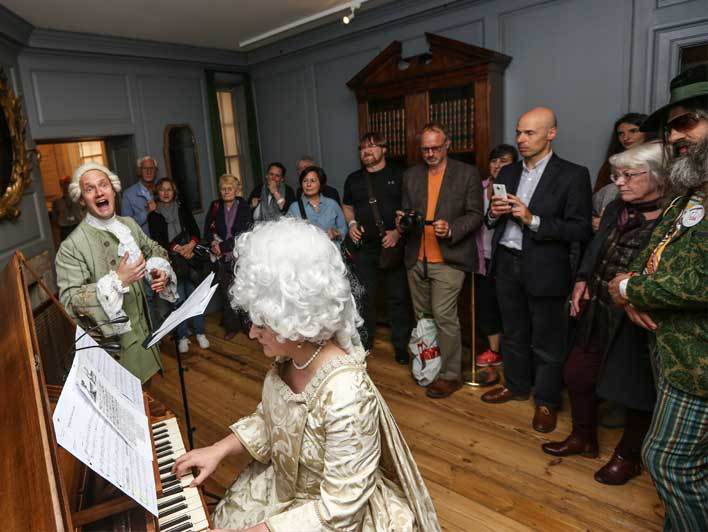GIULIO CESARE IN EGITTO (HWV 17)
Libretto: Nicola Francesco Haym
First performance: 20th February 1724, King's Theatre, London
Cast
- Francesca Cuzzoni (Soprano)
- Margherita Durastanti (Soprano)
- Francesco Bernardi, called "Senesino" (Alto castrato)
- Gaetano Berenstadt (Alto castrato)
- Signor Bigonzi (Alto castrato)
- Anastasia Robinson (Contralto)
- Giuseppe Maria Boschi (Baritone)
- John Lagarde (Bass)

Synopsis
The action is based on Julius Caesar’s Egyptian visit of 48-47 BC. Caesar has defeated Pompey, a rival Roman general, at Pharsalia in Greece and has pursued him to Egypt, where Cleopatra and her younger brother Ptolemy are joint sovereigns. Although the characters in the opera are based on historical figures – but with Caesar and Sextus portrayed as much younger than their counterparts in history – the details of the plot are largely fictional.
Act I
Caesar, accompanied by the tribune Curius, crosses the Nile and enters Egypt, where he is welcomed by the Egyptians. He agrees to an appeal from Pompey’s wife and son – Cornelia and Sextus – for a peaceful settlement of his and Pompey’s old rivalry. Achillas, an Egyptian general, arrives with a message of welcome from Ptolemy accompanied by a gift – the severed head of Pompey. Caesar sends Achillas back with a message of contempt and disgust. The grief-stricken Cornelia tries to kill herself, then faces an unwelcome proposal of marriage from Curius, who is keen to re-awaken an old relationship with her. Sextus swears to avenge his father’s murder.
Cleopatra, horrified to hear of Pompey’s beheading, decides to seek an alliance with Caesar against her brother and thus become Egypt’s sole ruler. Achillas reports to Ptolemy on Caesar’s angry reaction to the grisly gift and promises to kill the Roman, thus strengthening Ptolemy’s claim to Egypt, if he can claim Cornelia as his reward.
At his camp, Caesar reflects on the transitoriness of human greatness, surveying Pompey’s trophy and the urn containing the ashes of his head. Cleopatra in the guise of “Lydia”, a noble Egyptian maiden whose fortune has been stolen by Ptolemy, enters and appeals to Caesar for justice. Captivated by her beauty, he promises redress. Cornelia pays her last respects to her husband’s ashes and snatches his sword from the trophies, crying vengeance on Ptolemy, but Sextus seizes the sword from her and determines to undertake the task himself. “Lydia”, who has overheard this exchange, comes forward and, offering the services of the eunuch Nirenus as a guide, engages Cornelia and Sextus to join Cleopatra against Ptolemy.
Ptolemy invites Caesar to occupy the royal apartments that have been prepared at his palace, but Caesar recognizes that he must be cautious and watchful. Achillas introduces Cornelia and Sextus to Ptolemy, whereupon Sextus challenges Ptolemy to a duel: Ptolemy orders Sextus’ arrest and consigns Cornelia to work in the garden of the seraglio. Achillas offers to secure the release of Cornelia and her son if she will consent to marry him, but she rejects the idea firmly. Cornelia and Sextus commiserate on their fate before being led off separately.

Act II
Cleopatra has arranged an elaborate set piece for the seduction of Caesar, who is led by Nirenus into a garden of cedars with a view of Mount Parnassus and the Palace of Virtue. The scenery opens to reveal “Lydia” on the throne of “Virtue” with the nine Muses who (as a stage orchestra) accompany her in a ravishing aria. The scenery closes as Caesar runs towards it, but Nirenus assures him that Lydia is awaiting him and will introduce him to Cleopatra.
Cornelia, performing menial tasks in the seraglio garden, repels advances from Achillas and Ptolemy. She threatens to take her own life by throwing herself into the adjoining garden occupied by wild beasts, but is restrained by Sextus. He has come secretly, escorted by Nirenus, who now brings Ptolemy’s order that Cornelia is to be taken to the harem. Nirenus also suggests to Sextus that if he follows Cornelia he may catch Ptolemy alone and unarmed.
In another garden, Cleopatra waits for Caesar. After some flirtation the pair are interrupted by Curius, who tells Caesar that he has been betrayed and that conspirators are seeking to murder him. Cleopatra reveals her true identity to Caesar and then goes out, intending to quell the uprising through her royal presence. But she returns without success and urges Caesar to make his escape. He refuses and goes to face his assailants, leaving Cleopatra pleading with the gods to preserve him and to have pity on her.
In the harem Ptolemy lays aside his sword and anticipates the pleasures to come. He indicates that Cornelia is his choice. Sextus enters and is in the act of taking Ptolemy’s sword from the table when Achillas hurries in and snatches it. Achillas tells Ptolemy to prepare for war: Caesar, outnumbered by the supporters of Achillas, plunged from a balcony into the sea and is believed drowned; Cleopatra has fled to the Romans and is advancing with her men against Ptolemy. Achillas also reminds Ptolemy that Cornelia has been promised to him as his reward for killing Caesar, but he is curtly dismissed as a traitor and Ptolemy then departs, expecting a quick victory over the Romans. Sextus, now that he has no prospect of revenge, attempts to stab himself. But he is restrained by Cornelia, who restores his courage, and renews his determination for vengeance against Ptolemy.

Act III
Achillas, exasperated by Ptolemy’s broken promise, leads his troops to join Cleopatra. In the ensuing battle, Ptolemy’s forces are victorious and Cleopatra is taken prisoner. She mourns for Caesar, bewails her fate, and is led away. But Caesar is not dead: he appears, having escaped by swimming to the harbour, and the waves have brought him back to shore. He has lost contact with his troops and prays for help. Arriving at the same shore, Sextus and Nirenus come across Achillas, mortally wounded, who confesses his role in the death of Pompey and in the conspiracy against Caesar. He gives Sextus a seal which conveys the authority to command his troops, and tells him of a secret passageway to Ptolemy’s palace. Caesar witnesses the scene, takes the seal from Sextus and hurries off to assemble his forces.
As Cleopatra, heavily guarded, is bidding farewell to the women in her apartment, Caesar enters with his soldiers to rescue her. He drives out Ptolemy’s guards and the pair are reunited. Caesar tells Cleopatra to rally her troops, and to meet him at the harbour.
In the royal hall Cornelia again defends herself against Ptolemy’s advances. She draws a dagger and is about to attack him when Sextus enters, sword in hand, and claims the right of revenge. In the ensuing duel Ptolemy is killed. Cornelia’s fears are now over.
At the port of Alexandria Caesar and Cleopatra enter in triumph and Nirenus acclaims Caesar as emperor. Nirenus will be rewarded for his loyal service. Cornelia and Sextus enter, bringing news of Ptolemy’s death; Cornelia hands over to Caesar Ptolemy’s crown and sceptre. Caesar invests Cleopatra with these, and she declares herself a “tributary queen to the Emperor of Rome”. The pair declare their undying love, and everyone welcomes the return of peace to Egypt.
Donald Burrows
© 2003 Deutsche Grammophon GmbH, Hamburg
Context
In the early summer of 1723 Handel moved into a house in the newly developed Brook Street, in the fashionable London district of Mayfair. He was settled into the house by 8th August when his name, incorrectly recorded as George Frederick Hendon Esq., appears in the rate book of the Westminster Commissioners of Sewers. This was to be his home for the rest of his life, and was in an ideal location, with his publishers and a community of instrument makers just a short walk away in Soho, and the King’s Theatre within an easy coach ride.
Perhaps this new domestic stability gave him the space and inspiration to create his next three operas with such confidence. Giulio Cesare in Egitto, Tamerlano and Rodelinda were to follow each other over the next three years during a period of extraordinary creativity. Longer and more expansive than his previous Italian operas, these three works display perhaps Handel’s greatest contributions to the genre, combining engaging melodic invention with developed characterisation and truly dramatic situations. It is no accident of history that Giulio Cesare was to prove popular not only in its first production and subsequent revivals under Handel’s guidance, but also in the modern repertoire. On 10th March 1724 Monsieur de Fabrice was able to write to a friend:’…the opera is in full swing also, since Hendell’s new one, called Jules César – in which Cenesino and Cozzuna shine beyond all criticism – has been put on. The house was just as full at the seventh performance as at the first’.
Despite the opera craze that was gripping London at the time, with devoted fans siding with one or other composer, and voiciferously supporting their favourite singer, not everyone in the capital was quite as enthusiastic about Handel’s new production. ‘I was engaged to dine at Mrs. de Vlieger’s on Saturday, whence they all went to the opera of Julius Caeser, and I for one’, wrote the poet John Byrom to his wife. ‘Mr. Leycester sat by me in the front row of the gallery, for we both were there to get good places betimes; it was the first entertainment of this nature that I ever saw, and will I hope be the last, for of all the diversions of the town I least of all enter into this.’


